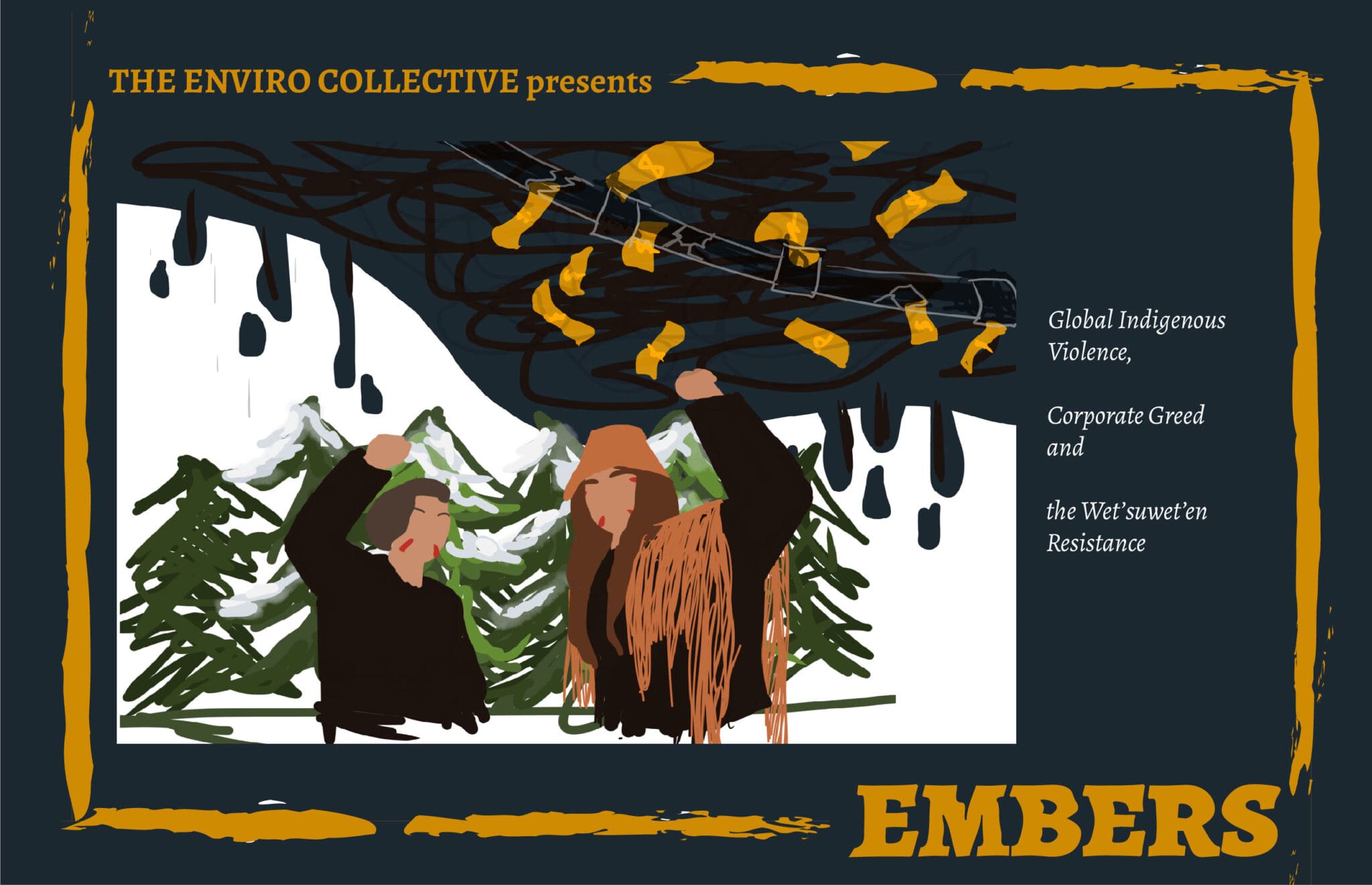“There is a difference between inconvenience and injustice…
don’t confuse one with the other.”
These words by Wet’suwet’en Hereditary Chief Woos represent the ongoing fight of First Nations against colonialism.
The Wet’suwet’en resistance is a blockade protesting Coastal GasLink — a pipeline project by big energy corporation TC Energy which would run 670 kilometres across the province of British Columbia, Canada. The pipeline will cut through a significant part of the sacred, unceded territory of the Wet’suwet’en people. Indigenous communities were never adequately consulted in regards to the project. Coastal GasLink considers the blockade an ‘inconvenience’. Such rhetoric is characteristic of the global injustices faced by indigenous peoples. In Victoria, Australia, the extension of a highway into Indigenous land forced the fight of Djab Wurrung people against the destruction of sacred birthing trees. In an interview by the SBS, an opposer of the resistance stated “it’s gonna happen regardless…let it happen so that it makes it easier for everybody”. This is another key example of the trivialisation of the Indigenous fight for land rights in western culture today.
The greed of corporations who thirst for profit extracted from Indigenous land deepens violence and racism experienced by Indigenous communities globally.
VIOLENCE AND RACISM TOWARDS FIRST NATIONS COMMUNITIES
For generations, First Nations communities have fought the devastation caused by colonialism; from innumerable massacres during early colonial invasion to the current disproportionately high levels of incarceration, deaths in custody, child removal and overall lack of financial, educational and mental health support. The Wet’suwet’en resistance is not a unique or isolated event, but rather a reminder of how colonialism manifests in modern society.
The Royal Canadian Mounted Police (RCMP) are at the forefront of violence and corporate protection against Wet’suwet’en resistance. Ironically, the police have labelled land defenders as “extremists” who are “violent in nature.”
The United Nations Rights of Indigenous Peoples (UNDRIP) are against the forced removal of the Wet’suwet’en people from their land, advising the RCMP to stand down. Despite this, the conflicting interests of the corporation and state to continue the project have suggested moving RCMP stationing from the current camps to Houston, British Columbia, even though it is also Wet’suwet’en territory.
The RCMP has exercised their state-given power by removing 80 land defenders from Wet’suwet’en camps along roads and during solidarity demonstrations. In February, the RCMP dismantled a demonstration of land defenders by forcefully arresting 43 peaceful and unarmed protesters. Some were carried away despite not displaying aggressive behaviour.
The words of Kalamaoka’aina Niheu, a woman born into the frontlines of the Hawai’i independence resistance, particularly resonate:
“Violence is embedded into
the fabric of society”
The unjust acts towards the Wet’suwet’en resistance have resulted in an increase in anti-Indigenous behaviour and hate crimes in Canada. A visibly Indigenous person buying groceries was assaulted from behind with a weapon, and a 14-year-old boy was subject to death threats and racial slurs on the way to school; both attacks linked to the pipeline developments. No charges have been laid.
CORPORATE GREED
First Nations people comprise 5% of the world’s population but protect 80% of global biodiversity. They are not standing down their ancestral land for the greed of corporations.
The $6.6 billion energy corporation project could potentially result in devastating impacts on the environment where the burning of 140 billion litres of gas transported via the pipeline would contribute to 13% of the greenhouse emissions produced by Canada daily.
Coastal GasLink argues the blockade is ruining the livelihood of 1,600 rail workers since they will be laid off, preventing future economic development. It is not uncommon for workers’ interests to be pitted against Indigenous justice and environmental actions. We must acknowledge the intersectionality of struggle, and that no struggle is genuinely separate. The state’s system of colonialism and corporate greed is the real enemy. Fortunately, groups such as the National Farmers Union negatively affected by the blockage have recognised its importance. They are standing in solidarity with the Wet’suwet’en land defenders.
When it comes to climate-hazardous corporations, their bond with the state makes it easy for them to violate fundamental land rights. Canadian Prime Minister Justin Trudeau addressed the “importance of unity across all people in the state” with empty promises. In signing off on the pipeline, he participates in the violent mistreatment of Indigenous people and their land. This allows for the ongoing attacks on the Wet’suwet’en nation and in turn, setting the standard for persecution of Indigenous communities globally.
If the gas leaks out from the pipeline, it will destroy the sacred land which generously offers food for energy. Water for life. Natural medicine for healing. Humans need all, but most importantly, the Wet’suwet’en people need it for survival — their livelihood and cultural practices depend on it. It may destroy everything that they fight for and believe.
THE RESISTANCE CONTINUES…
With distressing responses to the Wet’suwet’en resistance by those in power, made worse by the current pandemic, it is difficult to determine the outcome of the construction in favour of land defenders. However, the fight not only against the pipeline but against corporate greed and violence towards Indigenous communities globally has been paused but not stopped by a global pandemic. Going forward, we must stand in solidarity with the fight for Wet’suwet’en and First Nations rights to end all ongoing colonialism.





